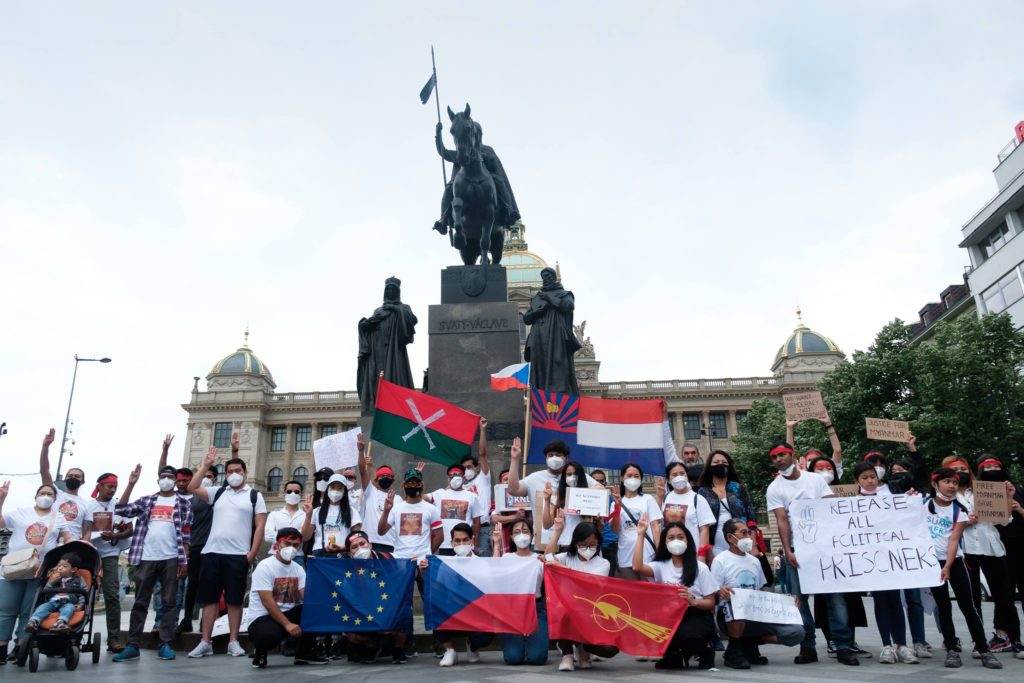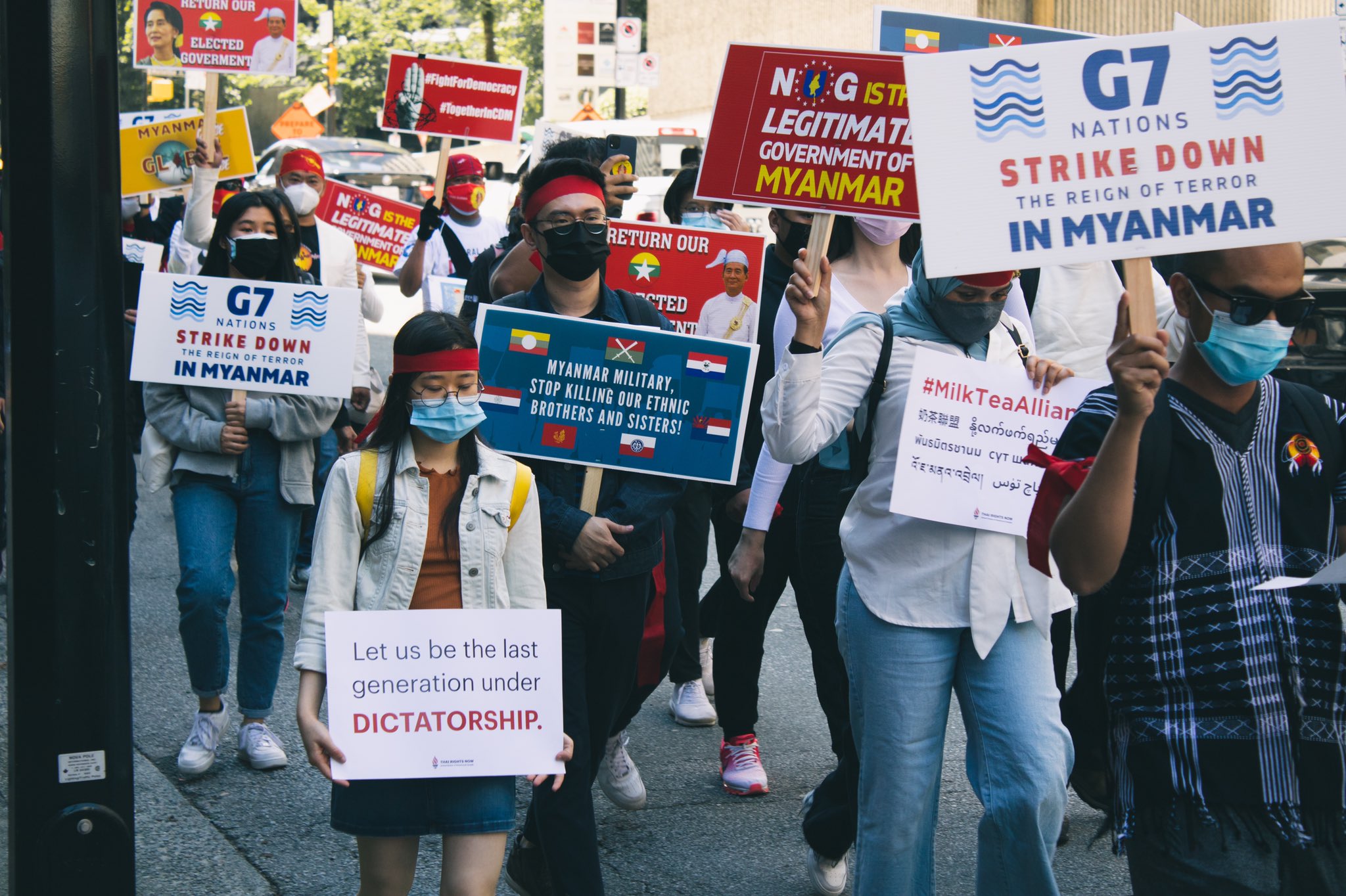Over the weekend, protestors around the world rallied in 48 cities across 25 countries including Myanmar demanding the international community take concrete action against the military junta. Myanmar’s pro-democracy movement also demonstrated their solidarity with the Rohingya with the viral #BlackforRohingya digital campaign.
https://twitter.com/GMSR22222/status/1403344911127224321
In Asia, Europe, North America, and Australia, protestors, wearing white T-shirts and red bandanas, took to the streets and demanded the release of political prisoners, and an end to violence and formation of a federal democracy in Myanmar. It was the second global weekend of actions organised by Global Myanmar Spring Revolution – Generation Z and Myanmar diaspora communities after tens of thousands of protestors rallied around the world in May in similar fashion.
The global action weekend coincided with the G7 summit in Cornwall in the UK. Protesters in Cornwall and around the world called on G7 leaders to “strike down the reign of terror in Myanmar.”
“The global actions brought together many Myanmar communities of all different ethnic and religious backgrounds — Chin, Kachin, Karen, Shan, Mon and other ethnic nationalities. This emerging new togetherness of different ethnicities is the biggest hope of the current struggle against the murderous and terrorist junta,” Igor Blazevic, a former head lecturer at the Educational Initiatives in Myanmar and protest organiser in the Czech Republic, told Coconuts Yangon.

In Paris, the Myanmar community introduced members of the National Unity Government on Saturday, gave statements of solidarity with ethnic and religious minorities and the ongoing civil disobedience movement, and sang songs in Place du Trocadero near the Eiffel Tower.
“The mood was serious but also playful at times. We wanted to gather and destress, and at the same time remain committed to protesting and supporting each other,” Kyaw Oo, a Myanmar protester in France told Coconuts Yangon.
In Vancouver, Hong Kong and Thai #MilkTeaAlliance activists joined the Global Myanmar Spring Revolution march. The formally digital alliance between Hong Kong, Taiwan, Thailand and Myanmar is beginning to materialize in physical spaces with solidarity protests around the world.
“It is this kind of alliance and friendship that I think is very threatening to the tyrannical regimes. Hence why we see so much clamping down on human rights defender and democratic movements. I hope that in the end, people of Myanmar and our friends from the Milk Tea Alliance will get to come together as we celebrate our victory in this communal resistance,” Yasmin Ullah, Rohingya social justice activist told Coconuts Yangon.
With our wonderful Thai friends from the #MilkTeaAlliance at the Global #MyanmarSpringRevolution march in Vancouver. No better way to spend a Saturday! Our Hong Kong friends who had a flash mob earlier, joined us in the march as well.
We won't stop until we are all liberated. pic.twitter.com/5jd1Sl09MI
— Yasmin Ullah (@YasminJUllah) June 12, 2021
The International Office of the Committee Representing Pyidaungsu Hluttaw (CRPH) issued a statement of support commending the global week of actions.
Official statement by @CrphMyanmar for the global action call on 12th-13th June. @G7, please listen to the Myanmar people's voice!#G7HearTheVoiceOfMyanmar#MyanmarIsGlobalCause#GMSR22222#WhatsHappeningInMyanmar pic.twitter.com/tCA18kbjQJ
— Global Myanmar Spring Revolution – GMSR (@GMSR22222) June 11, 2021
Rohingya solidarity
On Sunday, Myanmar social media was abuzz with the #Black4Rohingya campaign where supporters wore black and submitted messages of solidarity with the “world’s most persecuted minority.”
#Black4Rohingya #WhatsHappeningInMyanmar#June13Coup pic.twitter.com/yKcqDPcnYY
— NN (@Jimmuwu) June 13, 2021
NORTH DAGON, Yangon:
A group of people participated in #Black4Rohingya solidarity with Rohingya campaign by wearing black and marched to protest against military dictatorship. @ProtectRohingya#June13Coup #WhatsHappeningInMyanmar #MilkTeaAlliance pic.twitter.com/CcqOHLZ1yi
— Moe Moe Kyi Win (@ColetteKyi) June 13, 2021
https://twitter.com/KaungXatt/status/1404058854485286916
Launched in 2013 by South African based civil society organisation Protect the Rohingya, the campaign received viral support this year in the wake of the Feb. 1 coup. Last year, the hashtag generated 26,000 tweets. This year, the campaign surpassed half a million engagements on Twitter alone with tens of thousands of posts on Facebook as well.
In a special program on South African broadcaster Salaamedia, Rohingya activists from around the world discussed the significance of the #BlackforRohingya campaign and Rohingya solidarity in Myanmar.
“Our humanity is interconnected. When we see other human beings living in horrible conditions imposed on them by structures of power. It’s an expression of our humanity to show solidarity with others,” Amal de Chickera from Statelessness and Inclusion told Mayet yesterday.
“We all were amazed by the participation of our fellow Burmese yesterday. I was not expecting solidarity from my fellow Burmese at all after experiencing all kinds of discriminations, attacks in my life,” Nay San Lwin, co-founder of the Free Rohingya Coalition, told Coconuts Yangon.
“Some working for civil societies in Myanmar are very supportive to our cause but the majority thought we are intruders. They treated us like their enemies.”
The wider Myanmar public were indifferent to the Rohingya cause. Rohingya activists and civil society organisations were targeted with harassment, threats and hostility before the Feb. 1 coup. Journalists, civil society organisations and activists who advocated for the persecuted minority were also singled out and branded as lobbyists and profiteers of an ongoing campaign of genocide and forced displacement.
After the coup, anti-junta protestors began recognizing the plight of the Rohingya and began advocating publicly for an end to the violence, including the ongoing genocide in Rakhine state.
“When the military brutally killed the people they started realizing. When the military started producing fake news in MRTV & MWD they started realizing,” San Lwin added.
Human rights and democracy activist Thinzar Shunlei Yi recounted on Twitter a story of a woman who personally apologized to her and ethnic minorities and Rohingya after arguing against her advocacy for ethnic minority issues.
“That happens quite often now. I didn’t mind explaining or sharing my thoughts to anyone who’s mad because I was one of them before I learned new things,” Yi wrote on her Twitter.
For Rohingya activists like Ullah, she faced an uphill battle fighting for basic recognition of the Rohingya’s plight for many years. The participation this year from, especially from within Myanmar, “inspires her to continue her work.”
“This is what I dreamt of in the last few years. I had hoped to see people of Myanmar coming together to recognize our pain and frustrations throughout erasure and genocide,” Ullah said.
It’s the possibility of a truly pluralistic Myanmar that manifests in a small scale.”





Reader Interactions